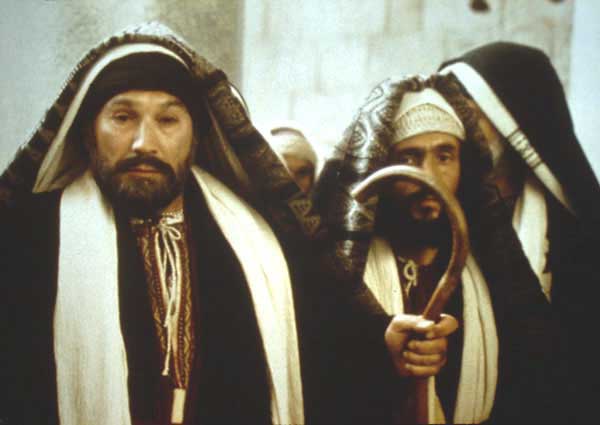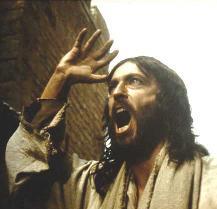Matthew 23:13
Matthew 23:13-15 (see also Luke 11:52; 1st Thessalonians 2:16)
“But woe to you, scribes and Pharisees, hypocrites, because you shut off the kingdom of heaven from people; for you do not enter in yourselves, nor do you allow those who are entering to go in. Woe to you, scribes and Pharisees, hypocrites, because you devour widows’ houses, and for a pretense you make long prayers; therefore you will receive greater condemnation. Woe to you, scribes and Pharisees, hypocrites, because you travel around on sea and land to make one proselyte; and when he becomes one, you make him twice as much a son of hell as yourselves. Woe to you, scribes and Pharisees, hypocrites, because you travel around on sea and land to make one proselyte; and when he becomes one, you make him twice as much a son of hell as yourselves.”
Luke 11:52
“Woe to you lawyers! For you have taken away the key of knowledge; you yourselves did not enter, and you hindered those who were entering.”
Ben Henshaw: “If those who are saved are the ones that God has unconditionally elected from all eternity, how could anyone, including the Scribes and Pharisees, prevent them from entering in? How could they possibly ‘shut off the kingdom of heaven’ from them? How could anyone ‘not allow [Jesus] to gather’ them to himself? If they are the elect, then nobody can effectively ‘shut off the kingdom’ from them; and if they are reprobates, it is God who has ‘shut off the kingdom’ from them (by refusing them his saving grace), and not the Pharisees!” (Calvinism and Free Will, an Exegetical Vindication of Matthew 23:37)
Question: How would you be able to “hinder” or “shut off” someone who is unconditionally elected to salvation with an irresistible grace?
Calvinist, William MacDonald: “And they hindered others from coming to Christ. They didn’t want Him themselves, and they didn’t want others to receive Him.” (Believer’s Bible Commentary, pp.1416-1417, emphasis mine)
If Calvinism was true, what difference would it make if the Pharisees and Lawyers didn’t want others to become Christians? How would they have any power whatsoever, not just to stop, but even to slightly hinder unilateral Irresistible Grace? The only answer from Calvinism that could make any sense is that they were merely being a nuisance, but in no way actually being successful in hindering even one person among Calvinism’s secret elect.
John Calvin: “Just so in these days we are driven to thunder out our denunciations of the papal clergy precisely in order that those not entirely reprobate, but still ready to learn, may take thought for salvation, and shaken by the judgment of God may break the fatal noose of superstition that holds them captive.” (Calvin’s New Testament Commentaries, Matthew, Mark and Luke, Vol.III, James and Jude, p.52, emphasis mine)
How is the alleged “dead man,” the “spiritual corpse,” being “not entirely reprobate” while at the same time being not entirely Regenerated, able to “take thought for salvation,” and “break the fatal noose”? Is Calvin suggesting that there is a way to believe in Christ apart from unilateral and irresistible Regenerative Grace? Calvin advances some puzzling concepts in light of his other statements. If there are people who are “not entirely reprobate,” then what did he mean elsewhere when he stated: “Those therefore whom God passes by he reprobates....” (Institutes of Christian Religon: Book 3, Chapter 23, Section 1, emphasis mine) If they were not entirely reprobate, were they were potentially elect?
John Calvin: “Even so today heaven is locked in the face of the poor people under the Papacy while the door keepers (at least those who are entrusted with the responsibility) use their tyrannical power to keep it shut.” (Calvin’s New Testament Commentaries, Matthew, Mark and Luke, Vol. III, James and Jude, p.53, emphasis mine)
According to the eternal decrees of Calvinism, who locked heaven’s door by “their tyrannical power to keep it shut”? According to Calvinism, it is God who allegedly has “...committed himself to save a certain number....” (The Doctrines That Divide, p.213, emphasis mine) But didn’t Calvin just say that these people were “not entirely reprobate” and could “take thought for salvation” and break loose the “fatal noose”? So which is it?
John Calvin writes: “Those therefore whom God passes by he reprobates, and that for no other cause but because he is pleased to exclude them from the inheritance which he predestines to his children.” (Institutes, Book 3, Chapter 23, Section 1, emphasis mine)
This is why Calvin’s explanation seems to be double-talk.
Calvinism: Figures of speech, nothing more. The Pharisees and Lawyers didn’t actually hinder any elect person from becoming saved, or lock any door to heaven, but merely made the sons of hell to become twice the sons of hell, nothing more.
Arminianism: People who could have been saved, and very well might have been saved, were swayed by the Pharisees and Lawyers, and ultimately perished.
Decide for yourself which of these two teachings is more representative of what the Bible actually says.

